Mary Anne Butler’s The Sound of Waiting is a response to former Leader of the Opposition in the Australian Government Tony Abbot’s comment in 2010 that “Jesus knew there was a place for everything, and it is not necessarily everyone’s place to come to Australia.” An allegory for a world that has closed its door on humanity, The Sound of Waiting uses magic realism to deep-dive on the question: as a global community, where do we go from here?
With just two characters, a refugee called Hamed, and an Angel of Death, Butler’s script is economical but her words have wings. Under the direction of Gail Evans (who directed Butler’s award-winning play Broken [2015]), Kyle Walmsley is devastatingly effective as the suited Angel of Death, his narcissism monumental. At the other end of the spectrum is Hamed Mokri, convincingly played by Osamah Sami, who embodies the trauma of millions of faceless refugees the world over.
The minimalist set by Kris Bird and lighting design by Jessie Davis evoke the enormous landscape of Butler’s imagination. With a stack of blocks, sheer voile backdrops and white, red and blue filtered light, The Sound of Waiting appears as beautiful as it is terrible. It takes you from war to sea, and below into its inky depths. You can’t look away.
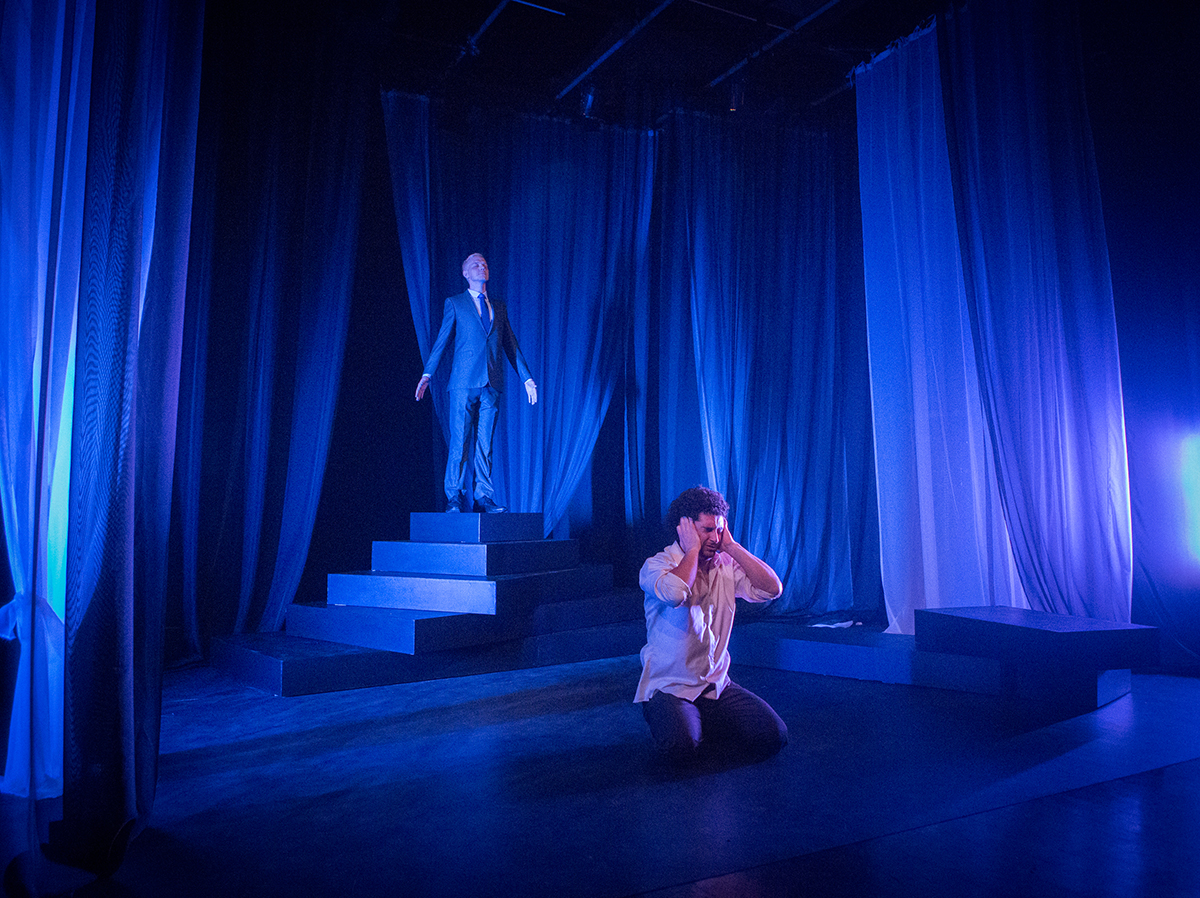
The Sound of Waiting, photo Glenn Campbell courtesy Brown’s Mart Theatre
The play opens with a soliloquy from the Angel of Death: “There is a space between sea and sky… the whisper between hope and despair… And if a person can reach in there — if they can grab that tiny sliver of light-capped possibility — then the rest of their life… will become golden-edged with opportunity.” Through the eyes of one refugee, Hamed, pitted against the Angel of Death, Butler explores that tiny space.
In a war-torn city, a bomb blast flings body parts of Hamed’s wife and small son past him in the street. He though is saved by the simple act of bending to tie his daughter’s shoelace. He notices that his son’s dismembered foot has one tiny stubbed toe. His wife’s scarf is caught on a bloody jaw bone. These details plunge us head-first into Hamed’s heartland. Based on an amalgam of asylum seeker stories, the drama is profound.
Hamed is barefoot and dishevelled, but it’s clear that he’s been a successful man. He clings to hope and logic in a world where life has been reduced to chance. We follow him as he deals with grief, escape plans, false documentation and officialdom. He and his daughter join the “river of refugees running to the ocean” and pack onto a boat. Hamed is every father — we ache at his loss, his desperation, we laugh at his jokes. We know this “leaking coffin” is his only hope.
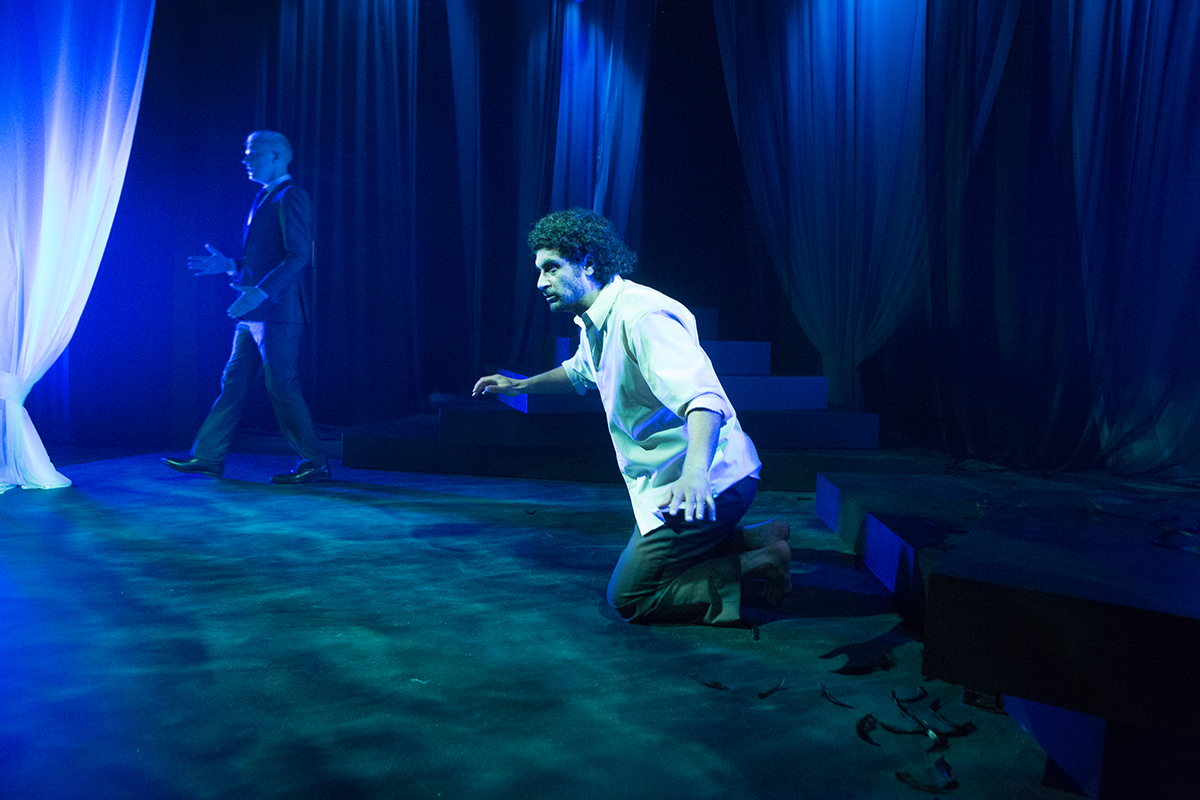
The Sound of Waiting, photo Glenn Campbell courtesy Brown’s Mart Theatre
Presiding over Hamed’s suffering is the Angel of Death, faithful minion of the Host. White light accentuates his chiselled features. His neat grey suit has black feather epaulettes. We are inexorably drawn into the mindset of this figure, who pumps and thrusts and flies with practiced perfection. The Angel of Death is steely, magnificent, unmoved — and all too familiar. The loss of lives will guarantee his continued status. He has been charged with responsibility for ensuring Hamed’s demise. His words conjure a storm in which the sky teems with murderous angels, waves crash, the leaking vessel sinks and life jackets dissolve like tissue paper. As lives are lost, black feathers rain from the sky. The Angel rejoices, but Hamed hangs on. Undeterred, the Angel takes the shape of Hamed’s loved ones and lures him to the bottom of the ocean.
We know how this ends. Some lives weigh more than others. The outcome is pre-determined. There can be no survivors. There’s nothing we can do. And yet, when Hamed gives up, we find ourselves willing him to live. We want the Angel of Death to show mercy. We feel the energy shift. The Angel loses his bearings. Has Mary Anne Butler managed to draw us into that tiny space where new choices can be made? The Sound of Waiting should be on every stage in every city and town in Australia.
–
Knock-em-Down Theatre and Brown’s Mart Productions, The Sound of Waiting, writer Mary Anne Butler, director Gail Evans, set, performers Osamah Sami, Kyle Walmsley, costume designer Kris Bird, sound designer Matt Cunliffe, lighting designer Jessie Davis; Brown’s Mart Theatre, Darwin, 25 July-6 Aug
Top image credit: The Sound of Waiting, photo Glenn Campbell courtesy Brown’s Mart Theatre
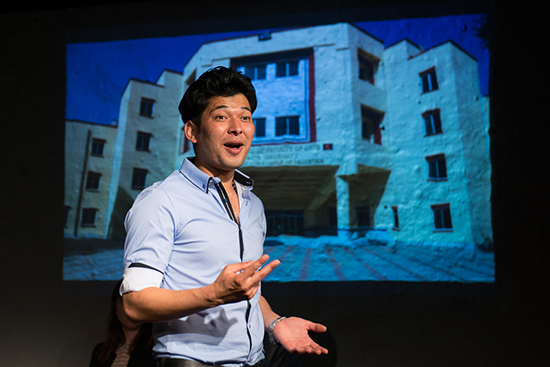
Mahdi Mohammadi, Tribunal, Powerhouse Youth Theatre
photo Alex Wisser
Mahdi Mohammadi, Tribunal, Powerhouse Youth Theatre
After playing to full houses at Griffin Theatre Company’s The Stables in 2016, where Karen Therese was artist-in-residence, Tribunal will now play at PYT’s Fairfield home from this week until 11 March. Fairfield is also the Western Sydney home to many of the people—Aboriginal and immigrant—who are the subject of this production. Some of them appear in it and what they have to tell us becomes a call to action.
In “A just hearing in the court of theatre,” I wrote that Tribunal’s Australian Truth and Reconciliation Tribunal, led by an Aboriginal Elder, “is a highly flexible hearing that allows for singing, dancing, re-enactments in which refugees deal with threatening Australian Government officials, and tender accounts of life in their countries of origin and in their new home. Above all, it allows Elder Aunty Rhonda Grovenor Dixon, to herself speak as a witness, providing a point-by-point analogy between the treatment of refugees and our Government’s maladministration of the lives of Aboriginal peoples. When one of the refugees asks if they can tell their story in their own words, Grovenor Dixon replies, ‘It’s theatre, you can do what you like’.”
Presentation is warmly and engagingly informal and the key performers—Grovenor Dixon, two young Afghan Hazaris, Mahdi Mohammadi and Jawad Yaqoubi, and community worker and lawyer Katie Green—are charismatic. Surprise guests and open discussion with the audience add to a sense of shared concern and allow us to identify directly with people we know of, if at all, as the largely anonymous subjects of news reports.
Tribunal reveals the persistent bureaucratic and social hostility with which Aboriginal people and refugees are treated and, for the latter, threats of deportaton for even minor traffic offences. The situation, as revealed by the latest Close the Gap report and the rise of the political right, is not improving, rather it has become more urgent than ever.
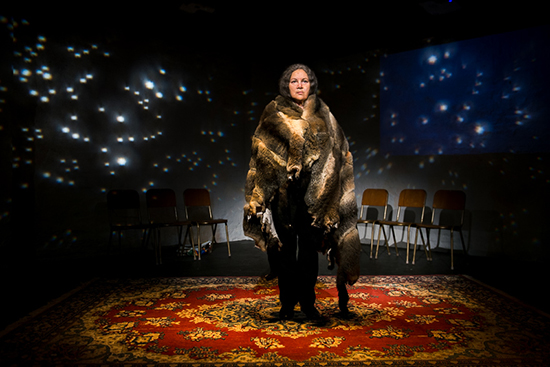
Rhonda Grovenor Dixon, Tribunal, Powerhouse Youth Theatre
photo Alex Wisser
Rhonda Grovenor Dixon, Tribunal, Powerhouse Youth Theatre
I asked Karen Therese about the current significance of Tribunal. She wrote, “It’s been only six months since we performed it at Griffin and the world has changed so much. It feels more important than ever now to listen to the words of Aunty Rhonda and Mahdi Mohammadi and Jawad. In Fairfield right now 6,000 refugees from the Syrian crisis are arriving to be re-settled—6,000 just in Fairfield. It’s big. There are crowds of Syrians and Iraqis in the streets outside PYT when I get my morning coffee. Doing Tribunal in Fairfield gives me opportunities to literally witness the world in action. The neighbourhood here gives me hope. We welcome everyone to visit Fairfield and support the local community.”
In one of Tribunal’s most affecting moments in the 2016 production, Mahdi Mohammadi and Jawad Yaqoubi recounted how they managed to reach Australia, but not their friend Nabi. Karen Therese tells me, “Nabi is on Manus Island, he’s been there for four years now. We send our thoughts and our love to him.”
Tribunal is set to reach a wider audience, Karen Therese tells me that it will be presented at Melbourne’s Arts House in July and before that in June as a “a live art version” at Sydney’s MCA.
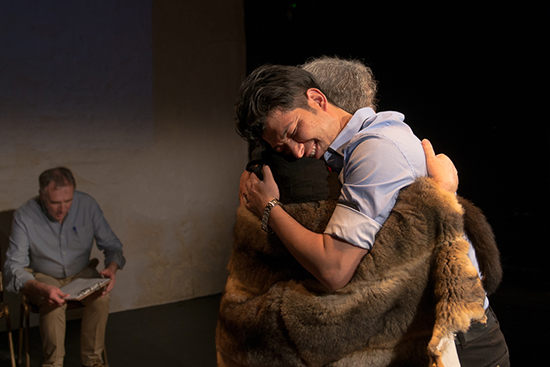
Tribunal, Powerhouse Youth Theatre
photo Alex Wisser
Tribunal, Powerhouse Youth Theatre
PYT, Tribunal, Thurs-Sat, 2-11 March, 7.30pm, The PYT Fairfield Theatre, 19 Harris St Fairfield
RealTime issue #137 Feb-March 2017
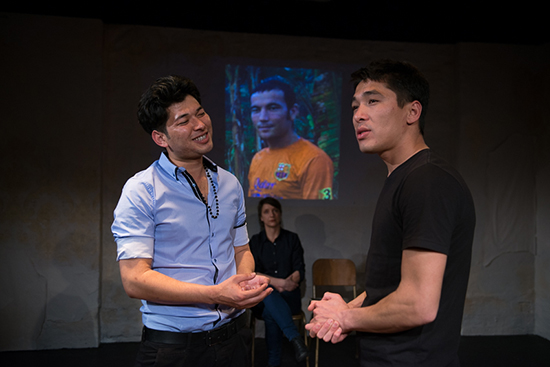
Mahdi Mohammadi, Jawad Yaqoubi, Karen Therese (background), Gholam Nabi (screen), Tribunal, Powerhouse Youth and Griffin Theatre
Tribunal is raw, conversational theatre built, rather fragilely, on a conceit: the holding of a public tribunal overseen by a female Aboriginal elder before whom refugees living in Australia tell their stories. It’s a highly flexible hearing that allows for singing, dancing, re-enactments in which refugees deal with threatening Australian Government officials and tender accounts of life in their countries of origin and in their new home. Above all, it allows the elder, Aunty Rhonda Grovenor Dixon, to herself speak as a witness, providing a point-by-point analogy between the treatment of refugees and our Government’s maladministration of the lives of Aboriginal peoples. When one of the refugees asks if they can tell their story in their own words, Grovenor Dixon replies, “It’s theatre, you can do what you like.”
Charismatic performers and the work’s informal structure lend Tribunal necessary cohesion and warmth. Two young Afghan Hazaris, Mahdi Mohammadi and Jawad Yaqoubi, bringing wit and casual energy to the performance, offer unfamiliar tales. Mohammadi is a theatre director, formerly the leader of a women’s rights theatre troupe built around Hazari women’s dance. In Kabul they played to audiences of women—whose husbands had to be bribed into ‘believing’ the women were going on a picnic—as well as performing in schools and a women’s prison. They also toured to India. However, back home, Sharia Law’s hostility to dance resulted in threats and the death of a relative, a prelude to Mohammadi’s leaving Afghanistan.
Another speaker addressing the tribunal is an impassioned community worker, lawyer and here, a strong performer, Katie Green, who worked for three years for Red Cross, supporting refugees released from detention. Her account of the arrival of refugees in Australia tells of “chaos,” always “a mad dash,” night time, “always dark,” herself carrying a large amount of cash in an Aldi bag to be distributed $400 per person to arrivals. The upside for Green was the sheer joy of seeing refugees re-united with family. But, with only 89% granted of a Centrelink payment per week, long-term prospects did not look good for these people. Given the intractability of the situation, “I felt like a cog,” Green says.
Karen Therese, wearing headphones, reproduces verbatim the words of a Human Rights lawyer, now based in London, who feels profound guilt at not being able to help a mother “who lost the plot,” washing herself compulsively after her child was sexually abused. After some four years the woman and child were granted refugee status and admitted to Australia but denied justice and compensation. It’s not precisely clear why the lawyer had to leave Australia, presumably compelled by the helplessness he shared with the Red Cross worker and, as he says, knowing “we were biting the hand [the Government] that was feeding us [Legal Aid]” and the likelihood, as has happened, of a reduction in funds.
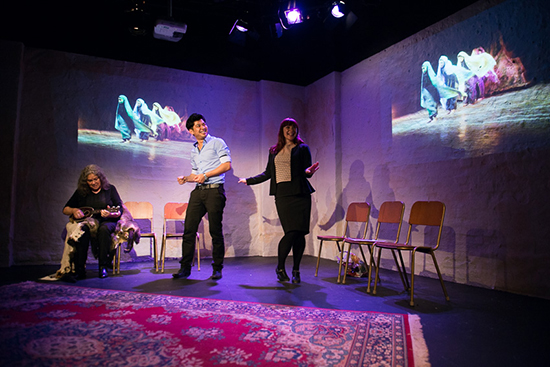
L-R: Rhonda Grovenor Dixon, Mahdi Mohammadi, Katie Green, Tribunal, Powerhouse Youth and Griffin Theatre
Not long after his arrival in Australia and with a bridging visa, Mohammadi is bluntly advised by a Department of Immigration officer (Paul Dwyer playing all the baddies) to abide by a code of conduct including not “running a red light” if he didn’t wish to lose his visa. It’s this which triggers Grovenor Dixon to declare that she recognises similar codes her people have been compelled to live by. But first she invokes her own proud standing as elder and grandmother, recites the names of her totems, displays a magnificent possum coat (with artwork on the inside) and recounts her father Chika Dixon’s activism on behalf of his own people, having defeated his alcoholism. Grovenor Dixon then recalls the code that led her grandfather, a fine tenor, to fear the loss of welfare payments if he spoke in language. The codes by which Aboriginal people are compelled to live today has resulted in mass imprisonment, the Intervention and suicide. Mohammadi says he can take no risks, there’s “no more party”—a neighbour might complain. Grovenor Dixon sings “Miss Celie’s Blues” from The Colour Purple and Mohammadi and Green dance, but the reprieve is short-lived, Mohammadi telling of young refugees killing themselves: “four while we were making this show.”
Grovenor Dixon offers consolation, acknowledging shared resilience in the face of these nightmarish circumstances. As a buzzing and a rumbling pervade the theatre, the performers form an awkward, slow-moving tableau, shifting back and forth or repeatedly half-sinking to the floor. Its significance eluded me. But, we are saved by tea, offered by traditionally dressed Iraqi members of Fairfield’s wonderful Parents Café which supports new arrivals to Australia.
Karen Therese opens the conversation to a hesitant audience—so much had already been said, so much to accommodate, all of us doubtless feeling the burden of privilege. A psychologist and guest of the production, Sarah Coconis, joins the artists, explaining that the impact of Australian racism (and our denial of it) “is worse than the original trauma” of being a refugee. We are, she says, like a bad parent, betraying those in our care.
Two final ‘scenes’ lift Tribunal to another plane. First a young man and woman (Bilal Hafda and Iman Etri), further guests of the production, step out of the audience and rap poems with verve, he telling us to “reclaim your honour” and “atone for your apathy,” and she, traditionally attired, declaring in her last lines, “This is what a feminist looks like,” having taken exception to an attitude that argues (as close as I can recall), “you’re the norm, my clothing oppression, yours fashion.”
Mahdi Mohammadi and Jawad Yaqoubi take centre-stage and fill in the missing part of their story, their coming to Australia. There were three of them in Indonesia after they fled Afghanistan. Mohammadi arrived here by boat, Yaqoubi by plane, having been granted refugee status, and Gholam Nabi Hayati who went by boat too but has now been on Manus Island for three years. The pair sing a song for their friend. Tribunal doesn’t so much end as open us anew to the plight of others and our responsibility for them. Closure seems as yet barely conceivable, but as public concern about refugee and Aboriginal suffering grows, Tribunal compels us to apply greater pressure to the Australian Government to respond to the needs of those in its care—in reality, our care.
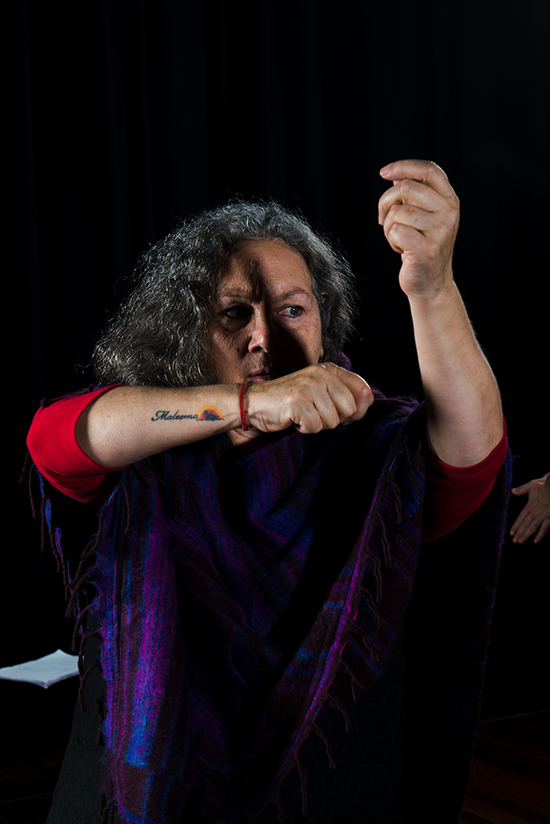
Rhonda Grovenor Dixon, Tribunal, Powerhouse Youth and Griffin Theatre
PYT [Powerhouse Youth Theatre], co-presenter Griffin Theatre Company, Tribunal, concept Karen Therese, creative collaborators/text/performers Paul Dwyer, Katie Green, Rhonda Grovenor Dixon, Mahdi Mohammadi, Karen Therese, Jawad Yaqoubi, design Province Studio (Laura Pike, Anne-Louise Dadak), sound, video design James Brown, lighting Emma Lockhart-Wilson; SBW Stables Theatre, Sydney, 12-20 Aug
RealTime issue #134 Aug-Sept 2016



